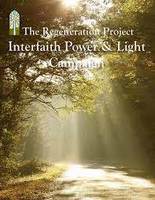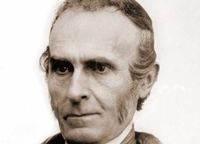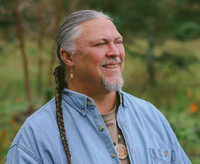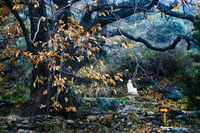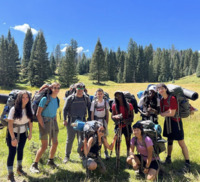Search
83 items
-
The Regeneration Project
The Regeneration Project was created as the parent project of Interfaith Power&Light. It is meant to help deepen the connection between ecology and faith and to help people of faith recognize and fulfill their responsibility for the stewardship of creation. They do so through educational programs for clergy and congregations -
Skits & Readings - Creative Arts and Educational Resources
Worship resources on the themes of justice, peace, and care for creation curated by the New Community Project. This is a list of activities to engage and educate students on christian and sustainability teachings. -
A Buddhist Perspective on the Eco-Crisis from David Loy
This short video consists of David Loy discussing the Buddhist perspective on the Eco-crisis. He begins by describing anata, the belief that all things are constantly changing and there can be no such thing as a permanent self. He then talks about dukkha, which is the idea that human experience is short-lived and suffering results from excessive desire. These ideas come together to describe the Buddhist idea that there is no “self.” Loy maintains that, “our sense of self is usually haunted by a sense of lack.” This sense of lack and false sense of “self,” create issues for people that can be related to consumerism, the Eco-crisis, and more. -
The Worship of Nature
The Worship of Nature is a poem by John Greenleaf Whittier published in 1867. The poem describes nature and forests as a holy place and Whittier makes a comparison to it being an altar. He describes the winds as hymns of praise and the blue sky as the temples arch. -
Environmental Theology in Sikhism
The Sikh scripture declares that the purpose of human beings is to achieve a blissful state and be in harmony with the earth and all creation. They believe that humans have drifted away from that ideal and that this crisis is in need of an immediate and urgent solution. The crisis requires going back to the basic question of the purpose of human beings in this universe and an understanding of ourselves and the Divine creation. -
Sustainability Photo Contest
This RESTORExchange photo contest is being brought back from the pre-COVID era, and with an added collaboration with the Sustainability Institute. It's based around the question "What does sustainability look like?" This can include sustainability in environmental justice, technology, energy, lifestyle and wellbeing, society and culture, economy and politics, and any other context where you see sustainability in action. We want to see your perspectives and show all the different places that sustainability is practiced! Winning photos will be decided by a panel of judges (yet to be determined), and the top four photos will win a prize! First place will receive $400, second place will receive $300, third place will receive $200, and an honorable mention will receive $100. Submissions will be accepted through March 15, 2023. -
Marianist Environmental Education Center
"The Marianist Environmental Education Center (MEEC) is an environmental education community in the Catholic tradition. In Mary's hope-filled spirit, we preserve and act in communion with the land and educate other communities in sustainability through ecology-based simple living, social justice and spirituality." -
Advent Simplicity Challenge
"This Advent, commit to simplicity. In a season that can mistakenly be focused on gifts and consumption, explore ways to live simply as we hopefully prepare for the coming of Jesus and the restoration of the earth. This year, we’ll be mixing in new daily challenges, as well as accompanying PDFs for folks who prefer not to use the interactive calendar." -
Decolonizing Thanksgiving
"As we head into the Thanksgiving holiday weekend in the United States, it’s great to think about all the things we can be grateful for. It is good to have a time to pause and reflect, to participate in the seasonality of gratitude for the year’s bountiful harvest, and to gather with family and friends. (We’ll ignore the über-consumerism of the day following Thanksgiving…)
Many of us probably know by now, however, that the story many of us learned in school about the first Thanksgiving is rather inaccurate at best, and racist and paternalistic in many ways, with a focus on the Manifest Destiny idea of the divine mandate for Europeans to conquer the “New World” in the name of Christ and country.
A few questions come to mind (at least my mind), for those of us with European-American roots, such as:
Should we even celebrate Thanksgiving, since it’s so tainted with colonialism?
What might it look like to “decolonize” our own understandings and our culture?
How can we do this work in a way that encourages our own folks to partner, rather than making them (our White brethren) feel further ostracized, but while also speaking real truth?
What can we do this Thanksgiving to begin to reconcile relationships damaged in the colonial era, both human to human and human to this land?" -
MLK Day 2024
"ServeOhio Funds 19 Statewide Service Projects Taking Place in celebration of MLK Day
These grants support more than 1,300 volunteers engaging in local community service projects across fifteen Ohio cities
ServeOhio, the Governor-appointed commission on service and volunteerism, announces grant awards to support 19 local Martin Luther King Jr. Day of Service projects throughout January totaling more than $25,000. Much like Dr. King’s legacy, these grants will help nonprofits across the state improve their communities through service and volunteer activities. The grants will fund service projects in fifteen Ohio cities led by more than 1,300 volunteers.
Each project commits to bringing volunteers together to create or improve community assets or infrastructure and supports local community engagement and impact. Additionally, every project includes an education component based on Dr. King’s message of peace, unity, and service to create long-term, sustainable change.
ServeOhio awards these grants with support from the American Electric Power Foundation. Each grant totals between $250 - $1,500." -
Evolution of the Collective Unconscious
"The collective unconscious is made up of experiential knowledge, symbols, and imagery that humans are naturally born with (no tabula rasa) and are rooted in ancestral experience and shared by all persons in all cultures. After millennia of evolution, the current collective unconscious of humanity would seem to include human exceptionalism, patriarchal hegemony, short-terminism, delusions of grandeur, illusions of unending growth, and the idolatry of technology. As the planet becomes overloaded with industrial civilization, our collective mindset seems to be unwilling to think long-term and face the realities of ecological overshoot. It remains to be seen whether our collective mindset can evolve to voluntarily refocus human agency toward contraction of the human enterprise, simplification of lifestyles, and peaceful resolution of conflicts before it is too late to prevent a chaotic collapse of industrial civilization." -
The World on Fire: A Buddhist Response to the Environmental Crisis
The World on Fire: A Buddhist Response to the Environmental Crisis by Katie Javanaud explores how Buddhist teachings can inspire environmental activism. Javanaud examines key Buddhist sermons, such as the "Fire Sermon," which metaphorically portrays the world consumed by the flames of greed, hatred, and delusion, resonating deeply with contemporary environmental challenges.
Greed is identified as a driving force behind the environmental crisis, fueling overconsumption and disregard for ecological balance. Javanaud illustrates how Buddhist principles offer insights to counteract societal norms of materialism and promote mindful living.
The article addresses common objections to applying Buddhist teachings to environmentalism, providing valuable perspectives for those interested in integrating spirituality with environmental activism. This article serves as a concise introduction to Buddhist environmentalism, offering clarity on the compatibility of Buddhist values with ecological stewardship. -
Taoist monks find new role as environmentalists
This article details the efforts of Taoist leaders in China to incorporate sustainability in Taoist temples and promote a culture of environmentalism. Since 2006, the Daoist Ecological Protection Network has gained the support of 120 temples who have converted to the use of solar panels and biofuels. Taoist monks noticed many people to be ignorant towards their environmental impact, living a life of hyper-materialism. Monks wanted to help educate society about the actions that can be taken to ameliorate environmental issues both at the temples and in daily life. This pursuit is driven by a fundamental belief in Taoism to live in harmony with nature, a value that could have large impacts on society if adopted. -
Capturing the Essence of Sustainability at Halifax Public Garden
"Capturing the essence of sustainability at Halifax Public Garden. This picturesque view of the tranquil lake connects the myriad benefits of green spaces, from promoting social connections and mental well-being to enhancing physical health and fostering equity within our communities to improving water and air quality. Serving as a reminder of the crucial role green spaces play in fostering sustainable communities. By preserving and nurturing our natural environments, we not only enhance our quality of life but also safeguard the health of our planet for future generations. Let's continue to embrace and support sustainability efforts for a greener, more resilient world." Taken by Aklema Iryn. Submitted to the RESTORExchange Sustainability Photo Contest. -
Low Consumption Activities
"Low consumption activities are fun, walking in Schmeekle Nature Reserve in late January during golden hour". Taken by Elliot Fey. Submitted to the RESTORExchange Sustainability Photo Contest. -
Nature is Bright
"Nature is bright". Taken by Arun Thamarakshan Nair. Submitted to the RESTORExchange Sustainability Photo Contest. -
Walks in February
"Going for walks in February at Schmeekle Reserve is sustainability." Taken by Elliot Fey. Submitted to the RESTORExchange Sustainability Photo Contest. -
New Mexico's Wilderness
"Standing in New Mexico's wilderness, geared up for adventure, I feel the perfect blend of excitement and responsibility. This sustainable journey allows me to appreciate nature's beauty while prioritizing its preservation. Each step honors ecosystems, guided by Leave No Trace principles. Through hiking, I connect deeply with the land and advocate for environmental stewardship, ensuring these wild spaces endure for future generations. It's not just about exploration; it's about respecting and protecting our planet." Taken by Shristi Tamang. Submitted to the RESTORExchange Sustainability Photo Contest. -
A Jewish Response to Environmental Stewardship: LEEDing the Way
The article highlights Temple Israel of Minneapolis's achievement of LEED Gold Certification, reflecting their commitment to sustainability through a multi-year renovation project. This accomplishment aligns with their Jewish values, particularly the principle of Pikuach Nefesh, which emphasizes protecting life and the environment. The synagogue's efforts extend beyond their building to include community-wide initiatives such as climate action resource fairs and partnerships with environmental organizations. Their ongoing commitment to sustainability is showcased through continuous improvements and active participation in broader climate justice movements. -
Pope Francis' Speech on UN World Environment Day
Pope Francis's speech on the United Nations World Environment Day emphasizes the importance of world solidarity to counter what he deems a current culture of waste. One prevailing message is the danger of consumerism. The pope extends a challenges to forgo excessive wealth in exchange for living a more simplistic lifestyle, which can help combat world health and hunger issues. -
ISNA Green Initiative
The “ISNA Green Initiative” was formed in December of 2014 as one initiative for the Islamic Society of North America (ISNA). The group aims to raise awareness of issues concerning the protection and conservation of the environment, as well as promote a sense of urgency with regard to the catastrophic effects of climate change.
The ISNA Green Initiative Team has created a myriad of ways to promote environmental social justice within the Muslim community. The group has developed standards for transforming Masajid into environmentally friendly places of worship and promoting standards for building Masjid that meet the standards of green architecture. One example of their educational programming includes the promotion of the practice of a “Green Ramadan,” designed to reduce waste, conserve resources, and reduce the use of harmful products such as plastic water bottles and styrofoam. Another example includes promoting the use of solar energy to reduce the use of fossil fuels. -
Existentialism an the Ecological Crisis
This segment of The Philosopher's Zone with David Routledge (on the Australian Broadcasting Corporation) focuses on the importance of existentialism in modern times. Specifically, how existentialism can help us understand current relationships between the self and others, as well as with nature. Likewise, the podcast’s contributor, Dr Dalia Nassar points out that existentialism implies a sort humanism (as Sartre argued) that connects each individual to all of humanity through their actions. It is the fact that each of our actions can affect one another is why the existentialists place so much emphasis on how we act. Furthermore, the podcast extends this to the ecological crisis by explaining how this radical humanism can inform how we make environmental decisions. The important point here is that we can derive environmental values based on the inherent freedom that humans have, there is a constant need for action. As the interviewer explains in the podcast, the individual determines the moral future of humanity and nature. Thus, each person has a moral obligation to transcend the current situation and make better choices for the environment. Likewise, there is a special attention to art and literature as a mode of connection, to hopefully shape others moral and environmental values. Therefore, existentialism provides a framework (much like religion) for guiding our actions based on a mutual care for the environment. Finally, I should note that the key points of the podcast (concerning the environment) starts at the 18-minute mark, while the latter half provides background knowledge on existentialism. -
Ancient Judean Dates
A date tree planted in Ketura, Israel from 2000 year old seeds found at an archeological site in the Judean wilderness has finally bore fruit earlier this month (September 2020). The harvest was hailed a modern miracle of science. “In these troubled times of climate change, pollution and species dying out at alarming rates, to bring something back to life from dormancy is so symbolic,”... Date palms were praised in the Bible and the Quran, and became symbols of beauty, precious shade and succulent plenty. -
Seeing true nature: Buddhism and the environment
John Worthington-Hill describes how Buddhism can encourage environmental awareness and sustainability. Embracing individuality is our disconnection from the natural world. In order to live in unity with the earth, we must find the 'middle way' (a buddhist morality based on self-discipline). "Self-centeredness is the great illness from which all imbalance, insensitivity and abuse ultimately stem – an illness directly linked to the Buddha’s ‘three poisons of greed, ill-will and delusion’. These poisonous mentalities seep into the collective consciousness and are instilled in the norms and structures of culture and society, helping to direct how politics and economics deal with the environment." "Environmental destruction is therefore an outer manifestation of an inner affliction. If our thoughts are polluted, then our actions will be polluted too, and so will their consequences." -
Five Years After Speaking Out on Climate Change, Pope Francis Sounds an Urgent Alarm
This article covers Pope Francis's reaction to the world governments responses to climate change. The Pope writes to unite people through religion in an effort to bring awareness to the movement. The article details how the church is divesting in fossil fuel companies. The article also focuses on the political divide and how it affects people's views on the climate crisis.

